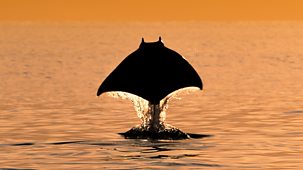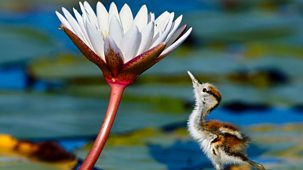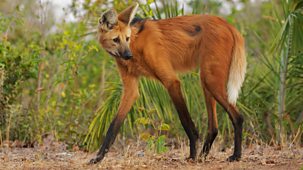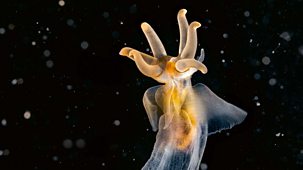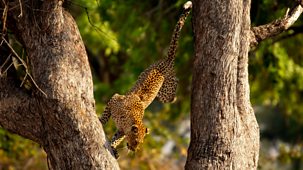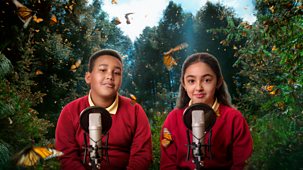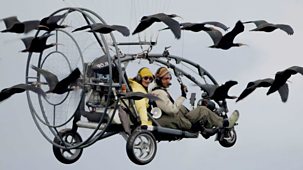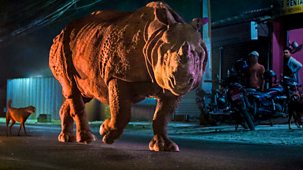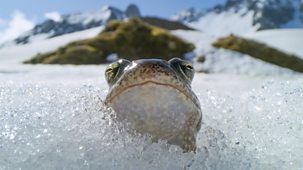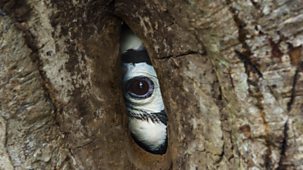Series 1: 2. Ocean
Much of our world remains virtually unexplored because most of it is under water. The ocean covers two-thirds of the planet and is home to 80 per cent of all animal life. Yet we know little about it. Presented by Sir David Attenborough, this groundbreaking film journeys through the vast and varied ocean to reveal the extraordinary behaviours and adaptations required for life there.\n\nThe shallow seas of the tropics may look like a paradise, but they are a battlefield, where even predators like the deadly lionfish must beware. Nothing is what it seems. The clown frogfish, the reef’s most extraordinary hunter, carries a fishing rod on its head, baited with a shrimp-like lure that can prove fatally seductive.\n\nAway from the tropics, in the cold waters off North America, the sun fuels forests of giant kelp. It is a dangerous place for young horn sharks. Giant sea bass and larger sharks patrol through the kelp. But the real danger is buried beneath. A little horn shark unwittingly stumbles into the ambush of an angel shark. With a lightning strike, it is swallowed whole. But it is not over yet – the little horn shark has a secret weapon. \n\nWinter storms can batter the forest and rip the kelp from the seabed, casting it away into the open ocean. Out in the big blue, the floating kelp becomes a vital lifeline for animals such as flying fish, which use them to lay their eggs. But they must lay thousands because these eggs are on the menu for hungry blue sharks. \n\nLife in the vastness of the open ocean relies on these islands of seaweed, but today they are being replaced by something altogether different – plastic. Every year, 12 million tonnes end up in the ocean. It is lethal to many, but some animals are learning to take advantage of these plastic rafts. Meet the Columbus crab. An open ocean creature with a big problem. Columbus crabs are poor swimmers, so to find a mate, they must hitch a lift. Passing turtles can help, and in fact provide a permanent home for a pair of crabs. In return, the crabs provide an onboard grooming service, a relationship that works so well that these turtles are often home to a devoted Columbus crab couple. \n\nFinding a partner in the ocean is not always easy. In the Sea of Cortez, mobula rays perform astounding acrobatic leaps to attract other rays, resulting in a gathering of vast numbers. All the noise, however, attracts a family of specialist ray-hunting orca that have a unique strategy to catch these fast and agile animals.\n\nThe least-known parts of the ocean are its great depths. To venture there requires specialised vessels to withstand the crushing pressure. As you leave the surface behind, sunlight fades and you enter an alien world, encountering a massive siphonophore, longer than a blue whale, and a gulper eel with huge jaws that can engulf prey larger than its own body.\n\nBy the time you reach the seabed two miles down, the temperature has dropped to near freezing, so cold that the eggs of a mother pearl octopus would take over ten years to develop. She heads to a special place where warm water escaping from the seabed creates a thermal spa. She is joined by 20,000 female octopuses, all here to raise their eggs – the largest-known gathering of octopus on planet earth. The warm water speeds up her eggs’ development, but it will still take two years and in that time this devoted mother will not leave them, not even to feed. It is an extreme effort that will eventually kill her.\n\nIn today’s ocean, animals are having to compete with us. Off the coast of Chile, South American sea lions have learned clever techniques to raid fishermen’s nets – which they now do in their thousands, but it comes with a huge risk. As the net is drawn in, the sea lions must get out quickly, or they risk being crushed and drowned. Sadly, the inexperienced young and pups don’t get out in time, and some pay the ultimate price.\n\nAnimals have evolved in remarkable ways to cope with the demands of life in the ocean. But can they now adapt to the new challenge… living alongside us?
Source: BBC 1
Most recent episodes of Planet Earth III
Planet Earth Iii
Series 1: 4. Freshwater
Fresh water is the lifeblood of planet Earth and the stage for extraordinary animal dramas. \n\nIn the heart of the Costa Rican rainforest, a little-known spectacle unfolds abov ...
20-04-2025
BBC 1
Planet Earth Iii
Series 1: 3. Deserts And Grasslands
In the baked Namib desert, a pair of ostriches raise their family in the searing heat to keep them safe from predators – but time is ticking as the chicks begin to hatch. ...
30-03-2025
BBC 1
Planet Earth Iii
Series 1: 2. Ocean
Much of our world remains virtually unexplored because most of it is under water. The ocean covers two-thirds of the planet and is home to 80 per cent of all animal life. Yet we ...
22-03-2025
BBC 1
Planet Earth Iii
Series 1: 1. Coasts
Sir David Attenborough explores the dangerous frontiers created by the world's coasts, where animals fight for survival amidst constant change.\n\nOn South Africa’s Robber ...
16-03-2025
BBC 1
Planet Earth Iii
Series 1: Wonders Of Nature
This special episode brings together highlights from the series, from hidden forests and turbulent coasts to vast, unexplored deserts. \n\nWe begin in the oldest desert on earth ...
03-01-2025
BBC 1
Planet Earth Iii
Narrated By Kids
This special Earth Day episode of Planet Earth III is narrated by schoolchildren across the UK. Because you don’t have to be Sir David Attenborough to become a voice for n ...
06-05-2024
BBC 1
Planet Earth Iii
Series 1: 8. Heroes
All around the world, there are heroes on the frontline of conservation who are risking everything in the fight to save wildlife. Sir David Attenborough introduces this programm ...
30-01-2024
BBC 1
Planet Earth Iii
Series 1: 7. Human
The human world, from our cities to our fields, has spread to every corner of the globe. Wildlife must now adapt to a vastly altered landscape… and contend directly with ...
23-01-2024
BBC 1
Planet Earth Iii
Series 1: 6. Extremes
David Attenborough reveals the extraordinary ways in which animals battle to survive the elements in a world of extremes - places where life exists on a knife edge. From mountai ...
16-01-2024
BBC 1
Planet Earth Iii
Series 1: 5. Forests
Sir David Attenborough journeys into the hidden world of forests, where lives are entwined in the most unexpected of ways. From the temperate rainforests of Canada, where rarely ...
09-01-2024
BBC 1
Most popular episodes of Planet Earth III
Planet Earth Iii
Series 1: 4. Freshwater
Fresh water is the lifeblood of planet Earth and the stage for extraordinary animal dramas. \n\nIn the heart of the Costa Rican rainforest, a little-known spectacle unfolds abov ...
20-04-2025
BBC 1
Planet Earth Iii
Series 1: 6. Extremes
David Attenborough reveals the extraordinary ways in which animals battle to survive the elements in a world of extremes - places where life exists on a knife edge. From mountai ...
16-01-2024
BBC 1
Planet Earth Iii
Series 1: 7. Human
The human world, from our cities to our fields, has spread to every corner of the globe. Wildlife must now adapt to a vastly altered landscape… and contend directly with ...
23-01-2024
BBC 1
Planet Earth Iii
Series 1: Wonders Of Nature
This special episode brings together highlights from the series, from hidden forests and turbulent coasts to vast, unexplored deserts. \n\nWe begin in the oldest desert on earth ...
03-01-2025
BBC 1
Planet Earth Iii
Series 1: 2. Ocean
Much of our world remains virtually unexplored because most of it is under water. The ocean covers two-thirds of the planet and is home to 80 per cent of all animal life. Yet we ...
22-03-2025
BBC 1
Planet Earth Iii
Series 1: 3. Deserts And Grasslands
In the baked Namib desert, a pair of ostriches raise their family in the searing heat to keep them safe from predators – but time is ticking as the chicks begin to hatch. ...
30-03-2025
BBC 1
Planet Earth Iii
Series 1: 5. Forests
Sir David Attenborough journeys into the hidden world of forests, where lives are entwined in the most unexpected of ways. From the temperate rainforests of Canada, where rarely ...
09-01-2024
BBC 1
Planet Earth Iii
Series 1: 8. Heroes
All around the world, there are heroes on the frontline of conservation who are risking everything in the fight to save wildlife. Sir David Attenborough introduces this programm ...
30-01-2024
BBC 1
Planet Earth Iii
Narrated By Kids
This special Earth Day episode of Planet Earth III is narrated by schoolchildren across the UK. Because you don’t have to be Sir David Attenborough to become a voice for n ...
06-05-2024
BBC 1
Planet Earth Iii
Series 1: 1. Coasts
Sir David Attenborough explores the dangerous frontiers created by the world's coasts, where animals fight for survival amidst constant change.\n\nOn South Africa’s Robber ...
16-03-2025
BBC 1


